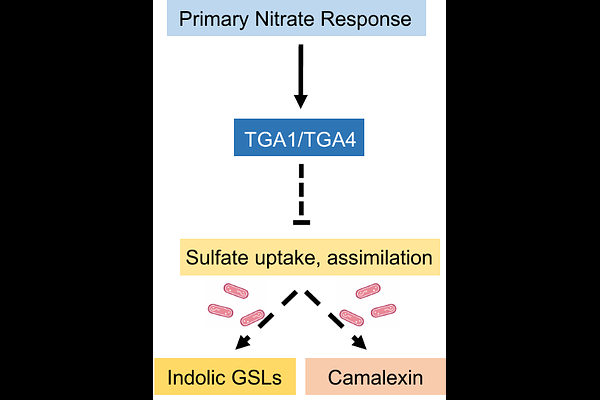Clade I TGA transcription factors are negative regulators of sulfate uptake and metabolism

Clade I TGA transcription factors are negative regulators of sulfate uptake and metabolism
Shukla, V.; Basu, S.; Koprivova, A.; Ristova, D.
AbstractIncreasing crop nutrient use efficiency can have dual impact; it can significantly reduce costs for fertilizers and mitigate global environmental repercussions caused by nutrient leakage. Understanding nutrient crosstalk in light of global environmental changes is crucial for improving nutrient use efficiency and food security. Here we show that provision of nitrate, but not ammonium, induces sulfate uptake and assimilation. We reveal that TGA1 and TGA4 are negative regulators of sulfate uptake, while other TGAs and the nitrate receptors NRT1.1 and NLP7 are not involved in this regulation. Our results show that TGA1 and TGA4 negatively regulate a larger set of genes involved in S signaling and metabolism, not only under nitrate provision, but also under S-deficiency. Under long-term S-deficiency, tga1 tga4 mutant had increased Cys levels in the shoots and showed better fitness. Additionally, TGA1 and TGA4 play a negative role in pathogen-induced indolic GSLs synthesis under sulfate deficiency. Similarly, clade I TGA TFs negatively regulate camalexin accumulation under pathogenic bacteria infection. Together, our findings suggest that TGA1 and TGA4 play an important role in the crosstalk of nitrate signaling with sulfate metabolism, and affect the function of S-metabolites in the interaction with pathogenic bacteria.